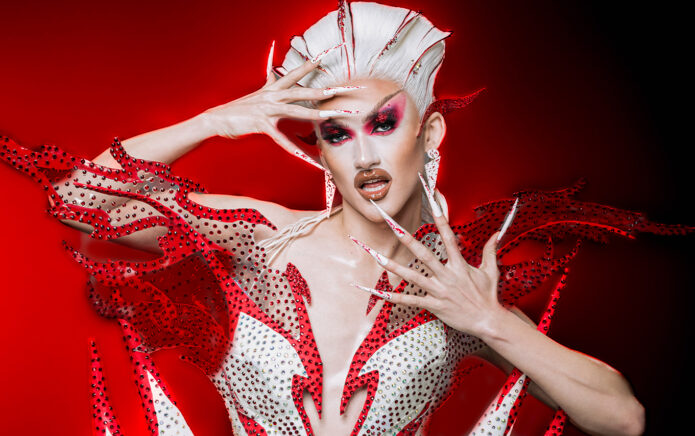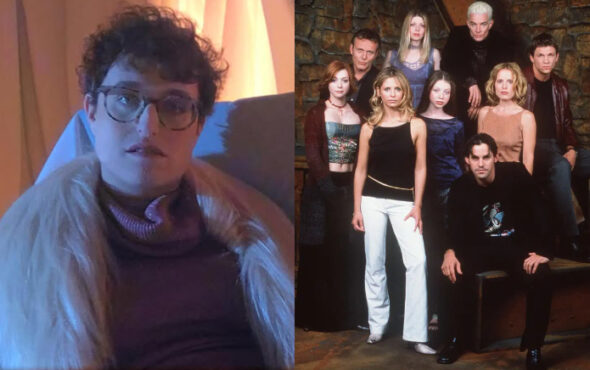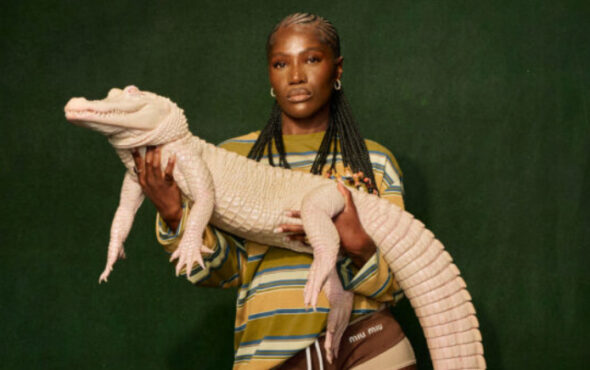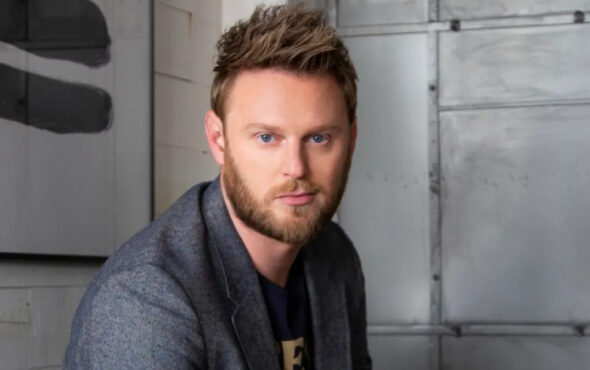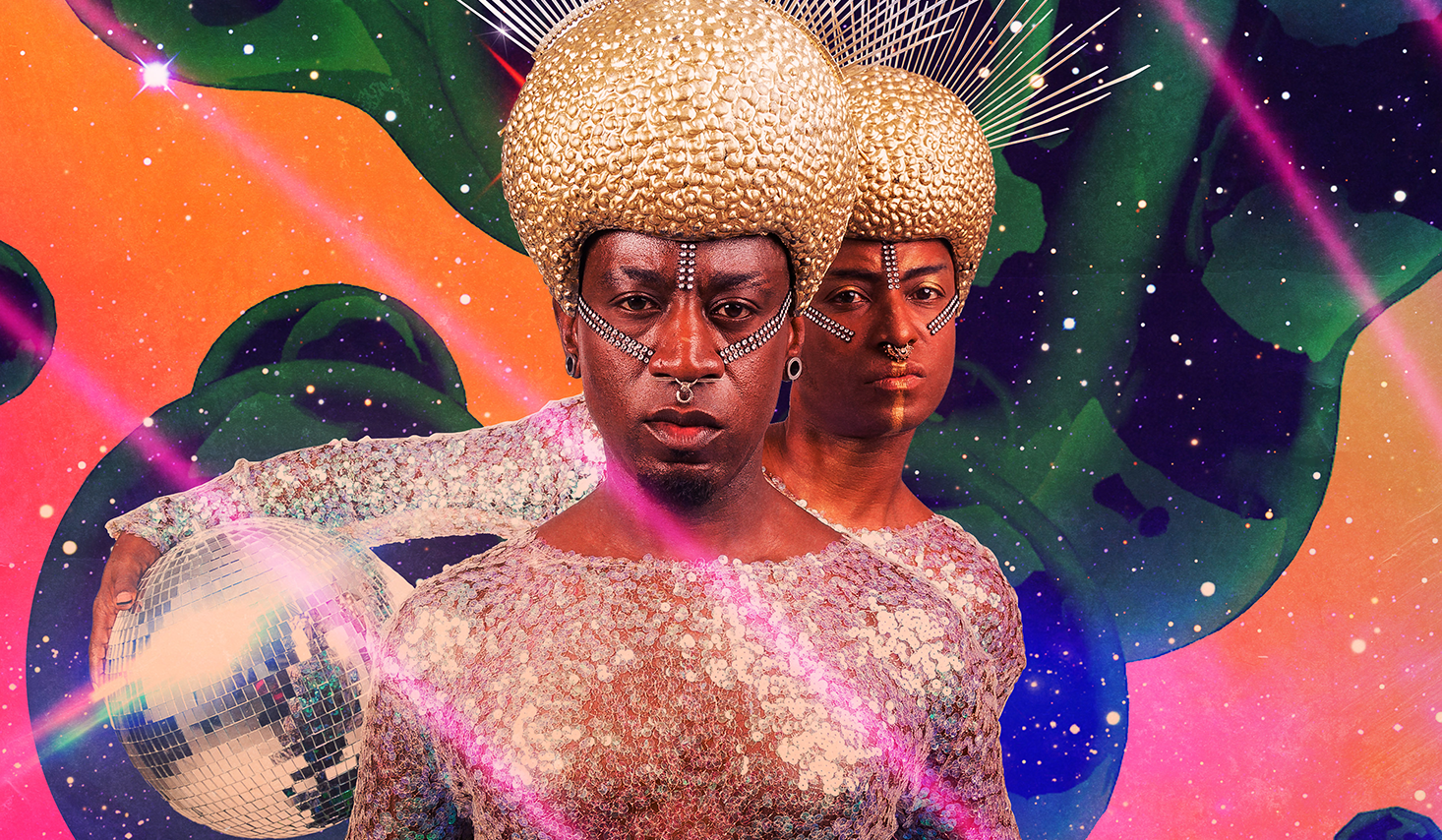
The Illustrious Blacks are the “NeoAfroFuturisticPsychedelicSu
“It’s really important for us to know that history and really embrace it. If we don’t, then moving forward, we have a chance of repeating things that don’t need to be repeated. If you don’t know your history, how can we possibly move forward?” says Monstah, to which Manchild adds: “This year’s Pride here in New York felt more like Pride to me, because people took to the streets to demand justice for trans Black women who are being murdered at an extremely high rate, and to show solidarity with the Black Lives Matter movement. It just felt like there was a real coming together as opposed to the years prior, where it just seems like a party centered around white, cis, gay men. This year felt like we were all invited to step up.”
Here, we chat with the dynamic duo about their incredible origins, the message they wanted to convey with TECHNEGROCOLOR and why the protests surrounding Black Lives Matter and Black Trans Lives Matter can’t be a phase. “Defying racism and white supremacy has to be a lifestyle. It has to be the new normal.”
How did the Illustrious Blacks come to be?
Manchild: We have known each other and been in each other’s lives for a long time, since we were very young. We met in a club, on the dance floor actually, dancing to dance music – so it’s very appropriate that we’re doing what we’re doing now. From then, we dated for a time and when that dating didn’t work out, we remained friends. I then moved to New York and was here for a couple of years before Monstah came. I always told him he should come to New York because I knew what kind of artist he was and what kind of work he did. It just lends itself to New York. So finally, maybe two or three years after I got here, he came. He came to visit me in my small studio apartment in Harlem and never left.
We met in a club, on the dance floor actually, dancing to dance music – so it’s very appropriate that we’re doing what we’re doing now.
Monstah: Right… We went on a date that night and I basically stayed. I’m still here!
Manchild: For the time being…
Monstah: Yes, pandemic is weighing on to our problems, but we’re holding on.
Manchild: We’ve been legally married since 2013, but we had the civil ceremony in 2003. Regarding our creative life, we were both doing our projects separately. I had a band, he had his own band and he was dancing and choreographing for himself and other people. I was at nightlife parties and stuff like that. People would always tell us that we should do something together. They were always interested in seeing what we would do if we worked together. We coined around with it because we were kind of apprehensive – working and being in a relationship is not always easy. Finally, we tried it, made a commitment to doing it, and people seemed to like it and we’ve been riding that wave ever since and it’s been about….
Monstah: Seven years?
Manchild: It’s been about seven years.
So you’ve actually been together around 17 years?
Manchild: Yes.
Monstah: 17 years!
We all know that in gay world, you have to double that number…
Manchild: Exactly!
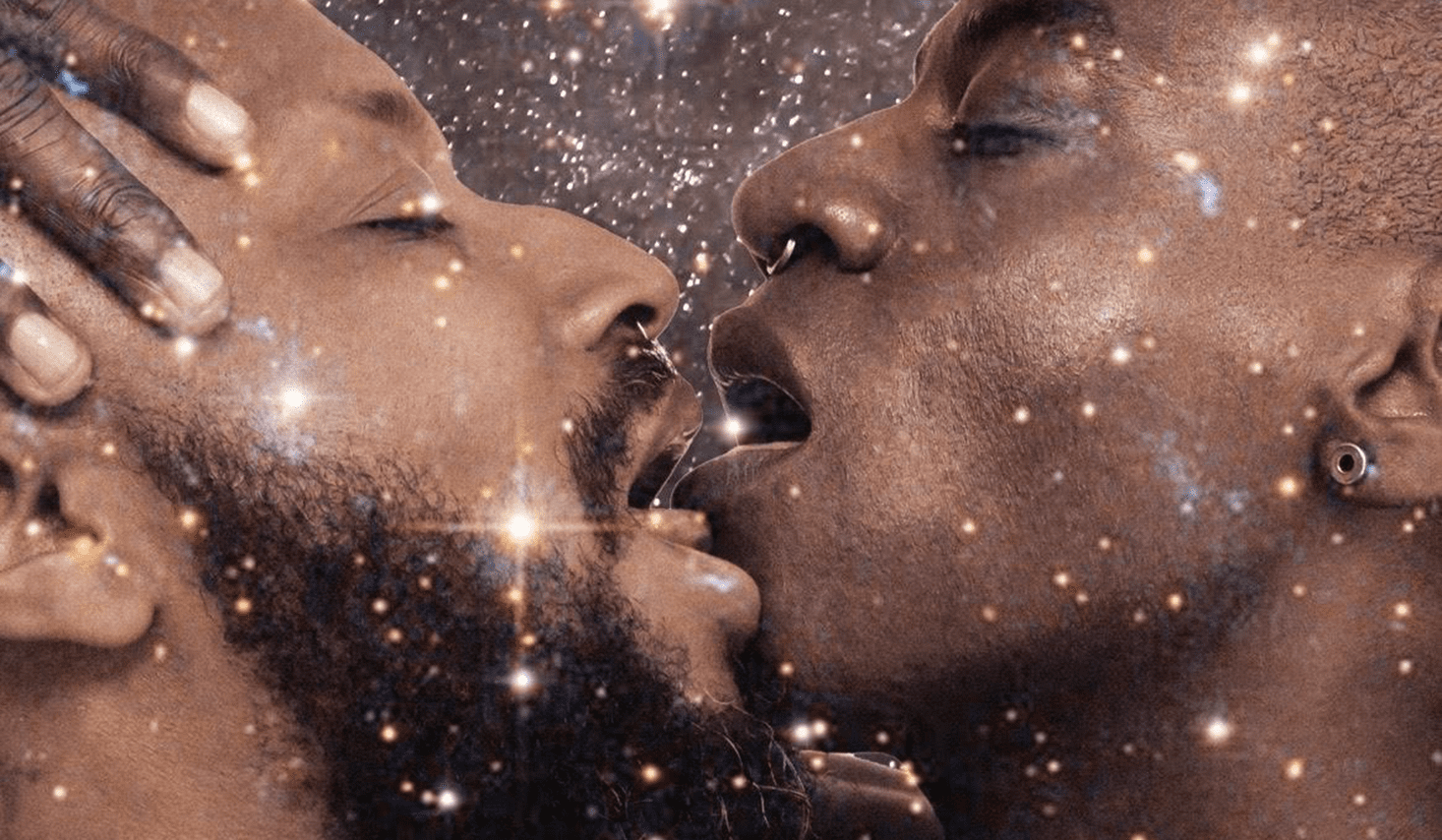
Well, massive congratulations to you both. So, what’s it like to be married but also co-workers? How do you balance that?
Monstah: Because we took our time coming together to work, we actually were able to really understand how the other one works, in terms of developing appearance and content for shows. Now we recognise those areas that are challenging for us in a partnership, in terms of our aesthetic and approach with getting from point A to point B. So now, we reach those moments where we recognise, ‘Okay, this is a challenging area, let’s step back, take a beat and have a conversation about it to move forwards,’ rather than getting inside of our ego and allowing ourselves to feel defensive about things. We try and laugh through a lot of it and then have conversations to clear it up. That saves the work for our relationship.
Manchild: Compromise is key. That, and also remembering that this is fun. We’re supposed to actually enjoy not only working together but being together and so, even in those serious moments, we try to remember to laugh and just be grateful that we’re able to do the work that we do. The pandemic in particular has been an interesting challenge because we literally have not been apart, so it’s constantly like, ‘Remember, this is fun!’
You both live on the stage. How does it feel to be stuck inside this whole time?
Manchild: We’ve found ways to do what we love. We’ve basically converted our living space into a studio, not only a recording studio but a film studio – meaning we’ve done a whole lot of streaming, a whole lot of virtual gigs. People have contacted us for virtual DJ sets and virtual performances and we’ll be performing a couple of songs that will hopefully inspire people to register to vote because we need them to vote this year.
Monstah: Like never before.
Manchild: So, we’ve been doing a lot of those types of gigs. We also do something every Wednesday at 1pm EST time, about an hour-long DJ set where we try to lift spirits and lift our own spirits as well.
It’s really important for us to know that history and really embrace it. If we don’t, then moving forward, we have a chance of repeating things that don’t need to be repeated.
You’re both famous in New York for your live events. How would you describe the atmosphere at your shows?
Monstah: It’s a very diverse community and everyone comes together because of the love for music, so there really is a genuine sense of universal love for all people. Diversity. So in terms of the pandemic and missing our shows, I feel like that’s what we’re missing most of all. It’s the communal feeling, being able to interact with people live and sharing that love for each other – and to get down!
Manchild: I think that once this is over, it’s going to be crazy! I mean crazy in a great way, because I think people are just aching for that kind of connection. We’re looking forward to when that day happens. Hopefully it will happen sooner than later, but that’s us being hopeful and optimistic.
Your new EP is absolutely incredible. What message did you want to convey with the music?
Monstah: Most of the songs from the EP actually came out of a show that we did in 2019, and it’s developed around our relationship with each other. It also involves a little bit of the backstory of the people that we were when we first met and how we came together. Whether there be challenges with our own individual coming out to the world and challenges of wanting to be accepted.
Manchild: Yeah. Those songs and some more that we have coming out soon, like Monstah said, are all from that show. You pretty much answered it, it’s about our relationship. Where we were then. A lot of the songs on this EP are introspective of when we were in our very, very early 20s. Step Back, for example, is really a song about what we would have loved to have said when we were being bullied. That’s really a response. Those are thoughts we had that went unsaid at the time. I mean now we manage, but back then it was a different time and we were different people. Rollercoaster is really around the ups and downs of being in a relationship with someone, but still being grateful for the ride and/or journey. The song Vow is a personal one, because it’s kinda how Monstah proposed to me in 2002. It’s based on his proposal to me, and let’s just say it was very ritualistic, what he did, and you would never imagine! Very creative, too. It involved water and rose petals and scents and nudity. It’s a long story but it’s depicted in that song very well.
Step Back is my favourite song on the album. You said it’s what you wanted to say to your bullies when you were younger – what would it have meant to you to have a song like this at that time?
Manchild: That would have been everything, to be honest with you. That was also part of the reason why we wrote it. We went on vacation one time to Myrtle Beach, South Carolina. When we went to eat, this woman stopped us and said, ‘Can you talk to my young friend here?’ She explained that he was being bullied, that he’s having a hard time in school and it literally took us by surprise. She wanted us to counsel this young man, and so we did. We stopped and talked to him. When we were creating the song, he was one of the inspirations for that. We didn’t tell him to say the things necessarily in the song but we put in his mind a…
Monstah: Sense of empowerment.
Manchild: Right. We wanted to put in his mind self empowerment. Even though we didn’t say what we said in the song verbatim, we think the idea came across in what we told him. Hopefully he took the message and ran with it. I hope he did.
Hopefully he’s quoting the song word for word at school right now.
Manchild: I hope he is!
Monstah: I hope so. I hope he gets back in touch. I don’t know if he ever followed us or not but, I kind of hope so. I wish I knew his name!
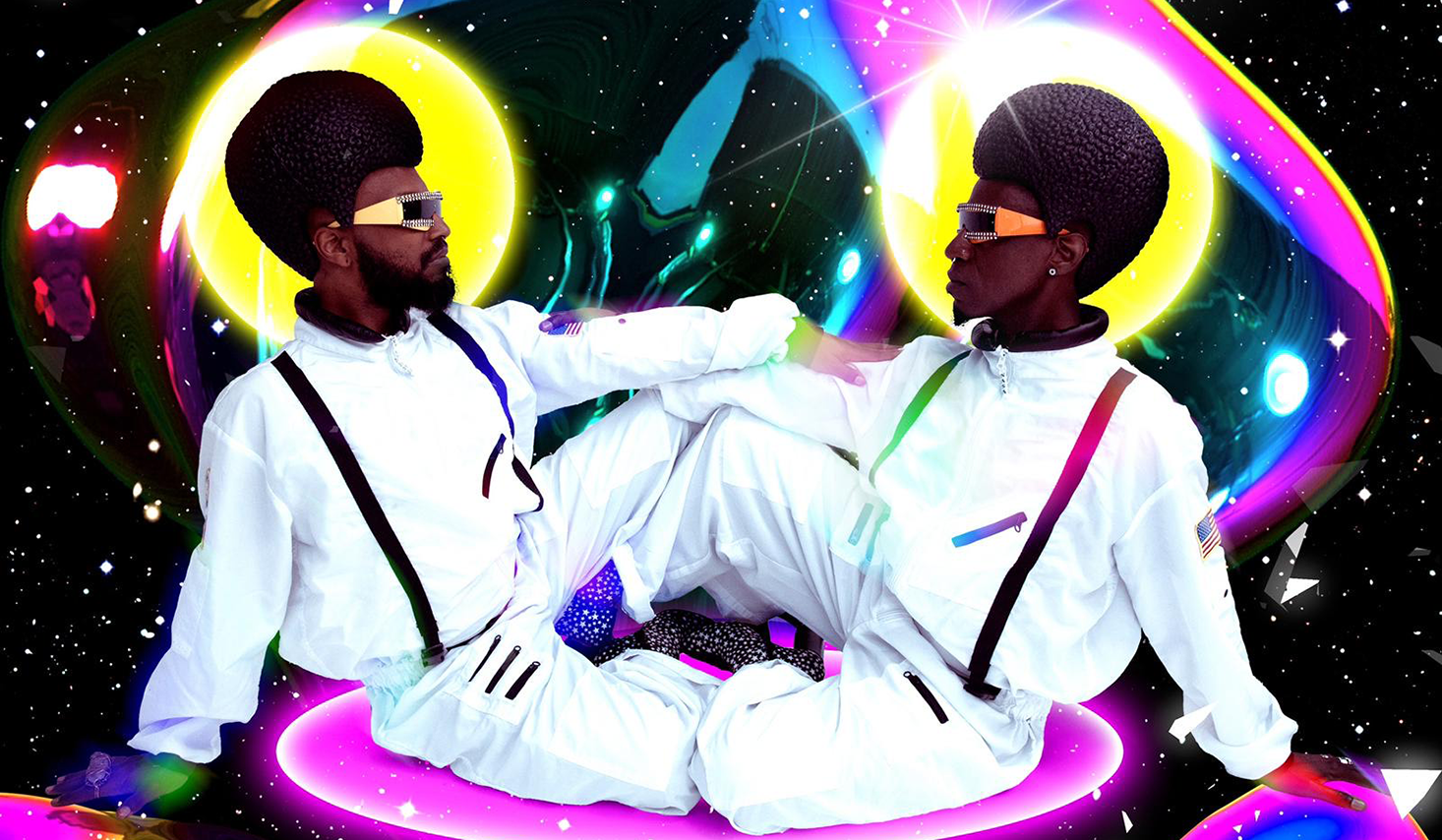
You’ve also said that Step Back is a tribute to the Stonewall Riots. How important is it for the LGBTQ+ community to remember their history and trailblazers such as Marsha P. Johnson and Storme DeLarverie?
Monstah: It’s really important for us to know that history and really embrace it. If we don’t, then moving forward, we have a chance of repeating things that don’t need to be repeated. If you don’t know your history, how can we possibly move forward?
Manchild: This year’s Pride here in New York felt more like Pride to me, because people took to the streets to demand justice for Black trans women who are being murdered at an extremely high rate, and to show solidarity with the Black Lives Matter movement. It just felt like there was a real coming together as opposed to the years prior, where it just seems like a party centered around white, cis, gay men. This year felt like we were all invited to step up. I hope that continues.
Monstah: Even with the programming for Pride events, it’s very tailor-made for white, cis, gay men. So if you’re a lesbian or of colour or transgender, it seems like you’re just out of luck. It’s turned very corporate.
Manchild: Since, I guess the 90’s, I’ve only known it to be that way. It was very refreshing and it was nice to see people remembering people like Marsha P. Johnson and Storme DeLarverie and the pioneers and seeing the inclusion of brown and Black colours on the rainbow flag. A few years back, that was very controversial here. A lot of people were up in arms about how they were adding colours to the flag to represent Black and Indigenous and people of colour. This year, I saw those flags everywhere. It’s like a lightbulb went off in people’s heads and they were like, ‘Oh, I get it now,’ even though we’ve been talking about it for a long time.
This year’s Pride here in New York felt more like Pride to me, because people took to the streets to demand justice for Black trans women who are being murdered at an extremely high rate, and to show solidarity with the Black Lives Matter movement.
What do you think Pride events in the future can learn from this year?
Manchild: I don’t think that it will. I have to remain optimistic that it won’t go back because of all that has happened. This is a change to our lives and lifestyles. Defying racism and white supremacy has to be a lifestyle. It has to be something about holding each other accountable. It has to be the new normal. So I think the official Pride events now, I hope, will have people of colour in those rooms making those decisions, so it’s not just the perspective of white, cis, gay men. There needs to be people of colour in there, women in there and trans men and women and bi people… everyone. I hope the table opens up so we can all have a seat.
Monstah: Well my hope is that it will happen, because of the younger generation. They’re seeing it now and they’ve seen how the changes are going to happen. So, they have something to delve into as they grow older. It’s being set up for them, so it’s up to them to hold on to it.
So, what’s next for you both? You have a new single coming out this month right?
Monstah: Yes! Gravitational. It’s about the energy that brought us together.
Manchild: We wrote that song, really with the moment we met in mind. We met in a club, on a dancefloor, and we were both dancing separately, alone. Then at some point in the evening, we found ourselves dancing together until the lights came on in the club. Gravitational is really about that moment. We never really mention it that much in the story when we’re telling it, but I think we should start including the story. Basically, the party we were at was very sexually ambiguous, meaning that it was mostly a crowd of straight people!
Monstah: True, it wasn’t a gay club or gay party, it was just a party and we both happened to be there.
Manchild: I happened to stick out like a sore thumb.
Have you considered pitching the story of your lives as a film? I’d buy a ticket!
Manchild: Well, funnily enough, we’re working on some stuff. Thank you, we needed that inspiration!
Let’s get into it then: who would play you both?
Manchild: Well that is a good question. To you Monstah.
Monstah: Jokingly at one point, I said that Janelle Monae could play me. She would be good! She would be great.
Manchild: Gosh, I don’t even know who would play me. I’m so complicated.
Monstah: I’m surprised you didn’t say Idris Elba.
Manchild: Well we’ll need a younger Idris Elba to play me, whoever that is. Whoever that is.
Monstah: Is there a younger Idris Elba there, Sam?
I wish. But if I have any people in mind, I’ll let you know. Let’s get this future Oscar-winner rolling.
Manchild: Yes! I would love that.
Monstah: We’re going to talk to Janelle and see what happens!
You can listen to The Illustrious Black’s brand new single Gravitational here on Bandcamp, as well as their EP, TECHNEGROCOLOR, below.
